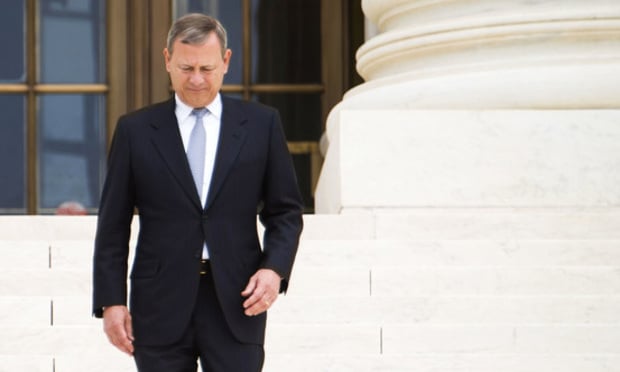Two Surprise Supreme Court Orders Show Why Recusals Matter
Two U.S. Supreme Court orders on Monday—one involving Justice Anthony Kennedy and the other Chief Justice John Roberts Jr.—show why recusals matter.
June 11, 2018 at 02:06 PM
4 minute read
The original version of this story was published on National Law Journal
 Chief Justice John Roberts Jr. at the investiture of Neil Gorsuch in June 15, 2017. Credit: Diego M. Radzinschi / NLJ
Chief Justice John Roberts Jr. at the investiture of Neil Gorsuch in June 15, 2017. Credit: Diego M. Radzinschi / NLJ
The U.S. Supreme Court case Washington v. United States may not have made big headlines. But it was an important and long-running dispute over Indian fishing rights, federalism and environmental issues that generated more than a dozen amicus curiae briefs.
On Monday, the court disposed of the case with two sentences: “The judgment is affirmed by an equally divided court. Justice Kennedy took no part in the decision of this case.”
Because Justice Anthony Kennedy recused himself in the case, a 4-4 tie-vote was all the court could muster—and when the justices are tied, the lower court ruling at issue stands. That amounts to a win for the Suquamish and other Indian tribes, with their salmon fishing rights protected.
Tie results can feel like a letdown for litigants, considering the resources firms invest in Supreme Court cases. Still, from a client perspective, a split ruling can be just as good as a full opinion—or better.
Why did Kennedy recuse? Justices don't usually say why, but in a March 23 letter to the parties, Supreme Court Clerk Scott Harris wrote that Kennedy “learned recently that, while serving as a judge on the Ninth Circuit Court of Appeals, he participated in an earlier phase of this case. The ordinary conflict check conducted in Justice Kennedy's chambers inadvertently failed to find this conflict.” That participation, it turned out, was 33 years ago.
The surprise one-page outcome of the case was not the only reminder on Monday of the importance of recusals in the Supreme Court's work. In lower courts, when a judge recuses, another colleague can step in. But at the Supreme Court, the justices are not fungible.
Chief Justice John Roberts Jr. on Monday recused in the court's denial of certiorari in Wyckoff v. Commissioner of Baseball—one of a number of perennial efforts to challenge the questionable exemption of major league baseball from federal antitrust scrutiny that has been on the books since 1922.
Roberts may have stepped aside because he owns between $100,001 and $250,000 in SiriusXM Radio stock, according to his most recent financial disclosure form. Liberty Media Corp. has 71 percent ownership in SiriusXM, and 100 percent ownership of the Atlanta Braves, one of the baseball teams being sued in the Wyckoff case, according to Gabe Roth of the transparency advocate Fix the Court.
Coincidentally, another petition aimed at Major League Baseball's antitrust exemption was also denied review on Monday: Right Field Rooftops v. Chicago Cubs Baseball. Roberts did not remove himself from that case, presumably because Chicago was the only team being sued, and it did not pose a conflict for Roberts or any other justice.
The somewhat cynical takeaway for future litigants who want to upend baseball's antitrust exemption again is this: If you think you want Roberts' vote, don't sue the Atlanta Braves.
Read more:
The Mystery Behind the Supreme Court's Dismissal of a Pending Case
Should Justices Conduct Online Research? | Why Recusals Matter
SCOTUS Justices Reveal Book Royalties, Teaching Fees, Stock Sales
This content has been archived. It is available through our partners, LexisNexis® and Bloomberg Law.
To view this content, please continue to their sites.
Not a Lexis Subscriber?
Subscribe Now
Not a Bloomberg Law Subscriber?
Subscribe Now
NOT FOR REPRINT
© 2025 ALM Global, LLC, All Rights Reserved. Request academic re-use from www.copyright.com. All other uses, submit a request to [email protected]. For more information visit Asset & Logo Licensing.
You Might Like
View All
MoFo Associate Sees a Familiar Face During Her First Appellate Argument: Justice Breyer

Litigators of the Week: 3 Former SGs Team Up In a Major Opioid Win for Pharmacies at the Ohio Supreme Court

'The Most Peculiar Federal Court in the Country' Comes to Berkeley Law

Litigators of the Week: The Eighth Circuit Knocks Out a $564M Verdict Against BMO in Ponzi Case
Trending Stories
- 1Arguing Class Actions: With Friends Like These...
- 2How Some Elite Law Firms Are Growing Equity Partner Ranks Faster Than Others
- 3Fried Frank Partner Leaves for Paul Hastings to Start Tech Transactions Practice
- 4Stradley Ronon Welcomes Insurance Team From Mintz
- 5Weil Adds Acting Director of SEC Enforcement, Continuing Government Hiring Streak
Who Got The Work
J. Brugh Lower of Gibbons has entered an appearance for industrial equipment supplier Devco Corporation in a pending trademark infringement lawsuit. The suit, accusing the defendant of selling knock-off Graco products, was filed Dec. 18 in New Jersey District Court by Rivkin Radler on behalf of Graco Inc. and Graco Minnesota. The case, assigned to U.S. District Judge Zahid N. Quraishi, is 3:24-cv-11294, Graco Inc. et al v. Devco Corporation.
Who Got The Work
Rebecca Maller-Stein and Kent A. Yalowitz of Arnold & Porter Kaye Scholer have entered their appearances for Hanaco Venture Capital and its executives, Lior Prosor and David Frankel, in a pending securities lawsuit. The action, filed on Dec. 24 in New York Southern District Court by Zell, Aron & Co. on behalf of Goldeneye Advisors, accuses the defendants of negligently and fraudulently managing the plaintiff's $1 million investment. The case, assigned to U.S. District Judge Vernon S. Broderick, is 1:24-cv-09918, Goldeneye Advisors, LLC v. Hanaco Venture Capital, Ltd. et al.
Who Got The Work
Attorneys from A&O Shearman has stepped in as defense counsel for Toronto-Dominion Bank and other defendants in a pending securities class action. The suit, filed Dec. 11 in New York Southern District Court by Bleichmar Fonti & Auld, accuses the defendants of concealing the bank's 'pervasive' deficiencies in regards to its compliance with the Bank Secrecy Act and the quality of its anti-money laundering controls. The case, assigned to U.S. District Judge Arun Subramanian, is 1:24-cv-09445, Gonzalez v. The Toronto-Dominion Bank et al.
Who Got The Work
Crown Castle International, a Pennsylvania company providing shared communications infrastructure, has turned to Luke D. Wolf of Gordon Rees Scully Mansukhani to fend off a pending breach-of-contract lawsuit. The court action, filed Nov. 25 in Michigan Eastern District Court by Hooper Hathaway PC on behalf of The Town Residences LLC, accuses Crown Castle of failing to transfer approximately $30,000 in utility payments from T-Mobile in breach of a roof-top lease and assignment agreement. The case, assigned to U.S. District Judge Susan K. Declercq, is 2:24-cv-13131, The Town Residences LLC v. T-Mobile US, Inc. et al.
Who Got The Work
Wilfred P. Coronato and Daniel M. Schwartz of McCarter & English have stepped in as defense counsel to Electrolux Home Products Inc. in a pending product liability lawsuit. The court action, filed Nov. 26 in New York Eastern District Court by Poulos Lopiccolo PC and Nagel Rice LLP on behalf of David Stern, alleges that the defendant's refrigerators’ drawers and shelving repeatedly break and fall apart within months after purchase. The case, assigned to U.S. District Judge Joan M. Azrack, is 2:24-cv-08204, Stern v. Electrolux Home Products, Inc.
Featured Firms
Law Offices of Gary Martin Hays & Associates, P.C.
(470) 294-1674
Law Offices of Mark E. Salomone
(857) 444-6468
Smith & Hassler
(713) 739-1250






